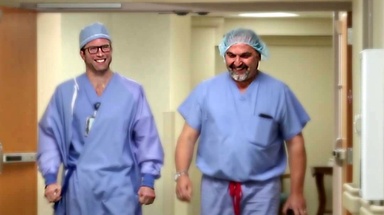
Brian Meeker, DO, has been a valued preceptor with the Carver College of Medicine’s Physician Assistant (PA) Program for nearly 30 years. His supervision and guidance through students’ family medicine rotations at Virginia Gay Hospitals and Clinics in Vinton, Iowa, has shaped the careers of generations of PA students, many of whom were inspired to dedicate their own careers to practice in rural Iowa.
Meeker was recently presented with the program’s first ever Lifetime Achievement and Service Award for his lasting dedication to educating Iowa’s PAs. In this Q&A, he shares a few words of wisdom.
What does a typical day as a preceptor look like?
In my peak years of teaching, I would be assigned 12 students per class, so I almost always had a student with me. I became very accustomed—and my practice became very accustomed—to having students present. Even now that I've retired from teaching, when I go into a room, a patient will often say, “Where’s the student?” It's just something that we've always done here; ever since the first class, we've always had PAs helping us deliver rural medicine.
The students who rotated here had access to at least 24 patients a day, the normal volume for successful primary care. We like to have the students leave here feeling ready for primary care and knowing what it’s like to see a steady volume of patients, do their assessments, formulate a plan, document the visit, and put in orders. We were hopeful that this rotation made PAs ready for the rigors of primary care.
How has the PA profession changed since you first started teaching?
I would say that the biggest change in the profession has been more independence for PAs. In our rural health clinics, our PAs are fully autonomous, and there's not even a physician in the building. I think the program has stepped up and made PA graduates ready for that.
The PA profession has adapted quickly to emerging technologies with the incorporation of point-of-care resources and electronic medical records over the years. Rather than going to a filing cabinet and pulling out a scientific article or guideline that I filed away, it became possible to have that right at the point of care, either embedded within the medical record itself or on a smartphone. It is a lot easier to look up references and be more confident with dosing, indications, and interactions of medications, for example. All of that has gone from paper to electronic during my career. The program evolved and changed to teach that, as well.
Our PA program is ranked No. 2 in the nation. In your opinion, what is the key to that excellence?
Access to a top teaching hospital and medical school provides access to great talent—both students and faculty. I think the program has become more competitive, and I’ve seen the aptitude and caliber of the students reflect that. They are bright, engaging, and they know what to expect.
From day one, I had them evaluating patients independently and presenting the case, their assessment, and their plan to me, and then we would go back in the room together. I would confirm their findings and put their plans into action or modify it, if necessary. That gave students some autonomy to make decisions rather than just observing what I would do. I think there's greater learning and retention when you're making decisions yourself.
What do you find most rewarding about this work?
Being involved in the teaching of Iowa PA students helped me stay current with clinical practice guidelines. The majority of our current PA staff were hired after their rotations with me, so I had a steady stream of talent.
It became readily apparent as many family physicians moved away from emergency room, call, hospital work, and procedures that I was also training the next generation of primary care providers.
What is the greatest lesson you learned?
Continuous learning is important in all professions, but none greater than rural primary care because we’re so isolated. For instance, the pandemic has caused shortages of staff, hospital beds, and mental health beds. In the past few years, we had to really expand our scope of practice. The patients in critical access hospitals are sicker because there's really no place to transfer them sometimes. We were providing a higher level of care than we were pre-pandemic, so we really learned not only our value as rural physicians, but the value of our PAs. There's been a lot to overcome, and we were in a good position to do that because of our affiliation with the PA program at Iowa. I don't know if we would've come through this if we didn’t have PAs.
What do you think will be your legacy as a preceptor?
I always told my students that I would expose them to a large volume of patients with a large number of problems. They could use this exposure to refine their diagnostic and problem-solving skills. They were also exposed to the pressures of taking care of a community, and not just the patient in front of them, so triage and prioritizing was part of the learning.
Many students had their first hands-on procedure experience in my office, and my patients came to expect and enjoy their student experiences. Students told us there was a word-of-mouth understanding that if you go to Vinton, you're going to get to do a lot and see a lot. A lot of PA students did their first hands-on suturing here. They'd say, “Well, I've done this in a lab, but never on a patient,” and I'd say, “That's fine, you’ve got to start somewhere.”